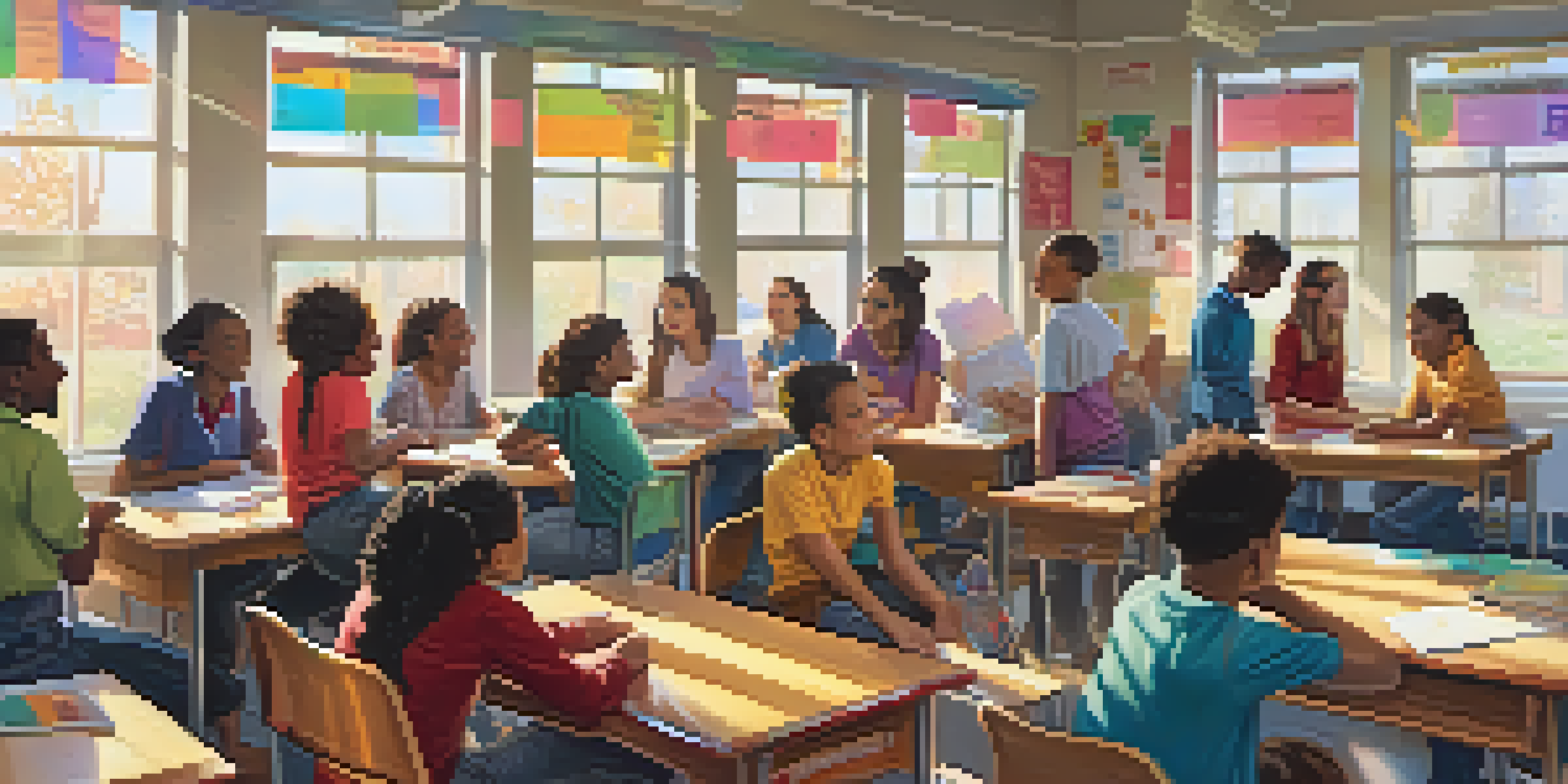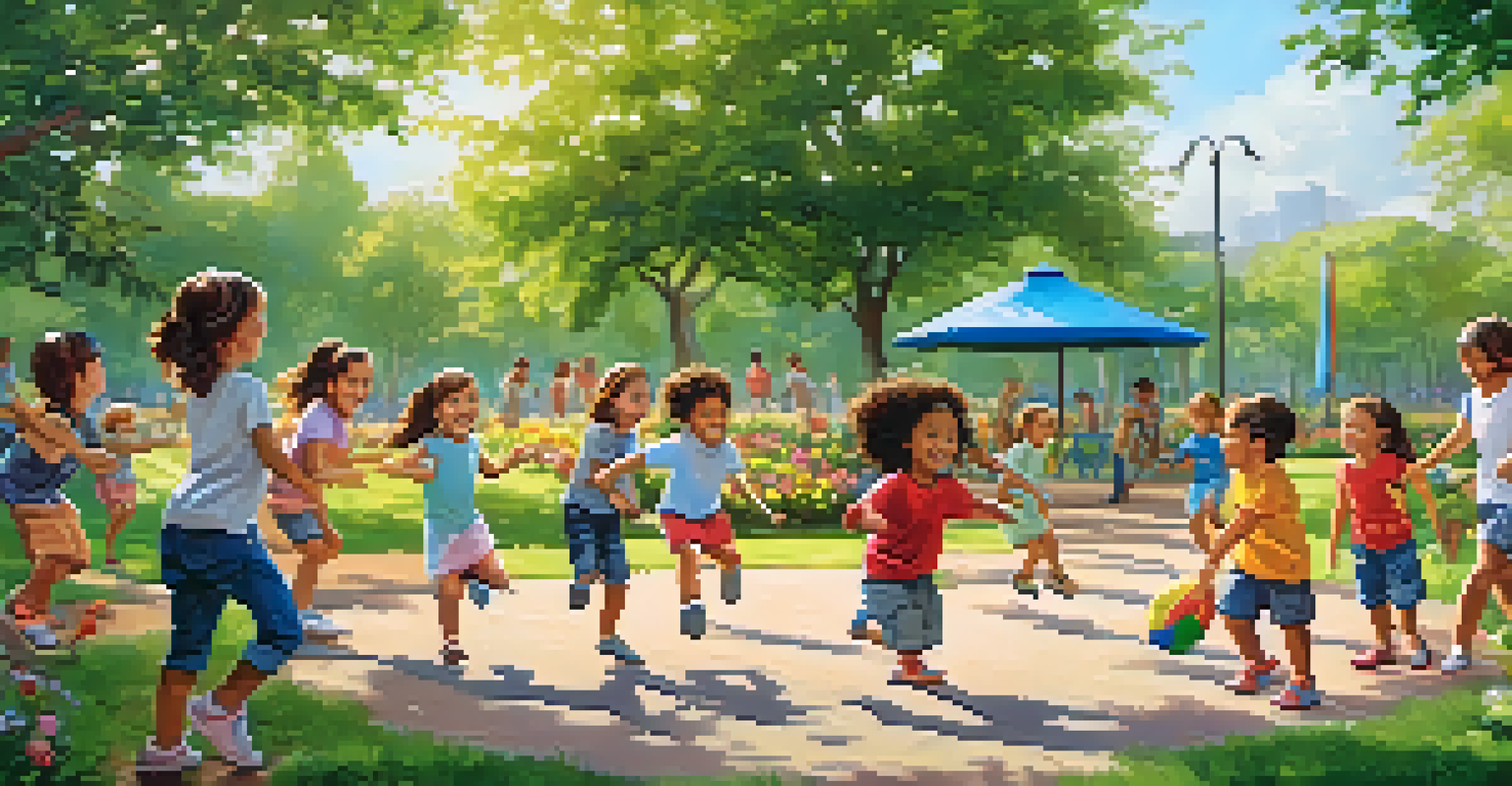The Importance of Social Learning in Youth Development

Understanding Social Learning: A Key Concept
Social learning is a theory that emphasizes learning through observation and interaction with others. Essentially, it suggests that young people learn not just from direct experience, but by watching those around them. This means that peers, family, and even media can play significant roles in shaping behavior and attitudes.
The greatest gift you can give your children is your time.
For instance, children often mimic actions they see in their environment, whether it’s sharing toys or using polite language. This observational learning helps them develop social skills that are essential for navigating relationships. By understanding social learning, we can see the importance of a supportive community in fostering positive youth development.
Moreover, social learning also highlights the power of modeling behaviors. When a child sees a sibling helping with chores or a friend standing up for someone being bullied, they are more likely to emulate those positive actions. This cycle of learning can create a ripple effect, encouraging a culture of kindness and cooperation among youth.
The Impact of Peer Influence on Development
Peer influence is a powerful aspect of social learning that significantly affects youth. During adolescence, young people are particularly susceptible to the behaviors and attitudes of their friends. This influence can lead to both positive outcomes, like encouraging academic achievement, and negative ones, such as risky behaviors.

Consider a scenario where a teenager is surrounded by friends who prioritize schoolwork; it’s likely they will adopt similar values and behaviors. Conversely, if their peer group engages in unhealthy activities, such as substance abuse, they may feel pressured to conform. Understanding this dynamic is crucial for parents and educators aiming to guide youth effectively.
Social Learning Shapes Youth Behavior
Social learning emphasizes that young people acquire behaviors and attitudes through observation and interaction with peers, family, and media.
Ultimately, fostering positive peer relationships can help mitigate negative influences. By encouraging participation in constructive activities, such as sports or clubs, we can help youth build a supportive network that promotes good decision-making and personal growth.
Role of Adults in Social Learning for Youth
Adults play a vital role in shaping the social learning environment for youth. Parents, teachers, and mentors are key figures who set examples and provide guidance. Their behavior and attitudes can significantly influence how young people navigate their social worlds.
We learn from our experience, but some lessons are best learned through the experiences of others.
For example, when adults model respectful communication and empathy, they teach youth important social skills. These lessons often extend beyond the immediate context, influencing how young people interact with peers and adults alike. This is why adult involvement is crucial in fostering environments where positive behaviors flourish.
Furthermore, intentional mentorship can help youth develop a sense of identity and purpose. By engaging with young people and sharing experiences, adults can help them build the confidence and skills necessary for success in various social situations.
Cultural Influences on Social Learning
Cultural context plays a significant role in social learning, shaping how youth perceive and interact with the world around them. Different cultures have varying norms and values, which can influence behavior and expectations. Understanding these cultural influences is essential for fostering inclusive environments.
For instance, in some cultures, collectivism is emphasized, teaching youth the importance of community and cooperation. In contrast, other cultures may prioritize individualism, encouraging self-expression and personal achievement. Recognizing these differences helps educators and parents tailor their approaches to better support diverse youth.
Peer Influence Impacts Development
During adolescence, peer influence can lead to both positive outcomes, like academic success, and negative behaviors, such as substance abuse.
Additionally, cultural narratives—whether through stories, media, or traditions—can profoundly impact youth development. When young people see themselves represented positively within their cultural narratives, it enhances their sense of belonging and self-worth.
Technology's Role in Social Learning Today
In today's digital age, technology has transformed how youth engage in social learning. Social media platforms and online communities provide new opportunities for interaction and observation. However, this shift comes with both benefits and challenges.
On one hand, technology can facilitate connections among youth, allowing them to share ideas and support one another. For example, online forums can be spaces for discussing challenges, celebrating achievements, and learning new skills. This broader access to diverse perspectives can enhance social learning.
On the flip side, technology can also expose youth to negative influences, such as cyberbullying or unrealistic comparisons. It’s essential for parents and educators to guide young people in navigating the digital landscape, ensuring they harness technology’s potential for positive social learning.
Encouraging Positive Social Learning Environments
Creating environments that promote positive social learning is crucial for youth development. This can be achieved through intentional design in schools, community programs, and family settings. By prioritizing inclusive and supportive atmospheres, we can help youth thrive.
For example, schools can implement programs that encourage collaboration and teamwork among students. Activities like group projects or peer mentoring not only build academic skills but also foster social connections. When students feel safe and valued, they are more likely to engage positively with their peers.
Adults Guide Positive Social Learning
The involvement of adults, such as parents and mentors, is crucial in modeling positive behaviors and creating supportive environments for youth.
Additionally, community organizations can offer resources and workshops that equip parents and caregivers with tools to support social learning at home. By working together, adults and youth can create a culture of support that nurtures healthy relationships and personal growth.
The Long-Term Effects of Social Learning
The impact of social learning extends far beyond childhood and adolescence; it shapes individuals into adulthood. The skills and behaviors learned during these formative years can influence career success, relationships, and overall well-being. Understanding this long-term effect can motivate us to prioritize social learning.
For instance, individuals who have developed strong communication and teamwork skills through social learning are often more successful in collaborative work environments. They are better equipped to handle conflicts and build meaningful connections. Thus, investing in positive social learning experiences can yield significant rewards in the future.

Moreover, positive social learning can contribute to a more empathetic society. When young people learn the value of kindness and cooperation, they carry these lessons into their adult lives, fostering healthier communities. In this way, nurturing social learning is not just about individual growth; it’s about creating a better world for everyone.